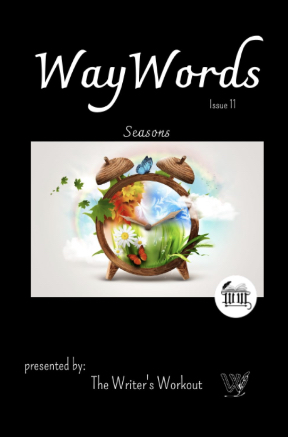Hearing sleet ping on the glass, Howard turned to see that it was  starting to snow. His favorite armchair looked through a wide, tall window into a courtyard dominated by a few honey-locust trees. Always black and gaunt in December, their scraggly upswept branch tips were now lost in wet white cloudbursts.
starting to snow. His favorite armchair looked through a wide, tall window into a courtyard dominated by a few honey-locust trees. Always black and gaunt in December, their scraggly upswept branch tips were now lost in wet white cloudbursts.
He sighed. The grass already wore a cottony mantle; the glistening sidewalks would soon whiten. The forecast was for enough snow to plow, but not a blizzard. Peggy would come for him in her four-wheel-drive “utility vehicle” (why were cars never just cars anymore?) and she drove well in snow. Of course: He’d taught her, almost four decades ago.
So it wasn’t about his getting there for Christmas Eve dinner; it was about the grands.
For an old man whose traveling days were over, Howard Peters took unusual interest in weather and airline disruptions whenever family gatherings were imminent. Young Howie (he and Marge had only daughters, so Peggy could christen her firstborn Howard Jr.) was taking his doctorate in Seattle, a continent away. His younger sister Maggie was studying in Chicago, and the youngest, Chad, was in Houston.
Howard enjoyed all the holidays. Peggy came for him at Harmony Acres and took him home for a good meal and good conversation. Yet last Easter, and again at Thanksgiving this fall, there’d been only the three of them, the younger generation too wrapped in studies to lose days to travel.
But all the grands would be there today. Or at least, hoped to be. And hearing the youngsters talk about their exploits in class, on teams – or in romance, if they could be persuaded to share that – would be the sauce that gave a holiday dinner its most important flavor.
Not that Peggy wasn’t a great cook, and her husband Charlie equally good. She made a cranberry side dish with piquant citrus-something that Marge got from a Quaker lady they’d known soon after they married; it was now called Marge’s recipe. He might today tell the grands about the gray Ohio Quaker who actually had a cranberry bog on a back corner of her farm. Or had he told that already?
The turkey was always Charlie’s: huge enough to just fit in the oven, slow-baked and often-basted so it came out with crackling skin and moist, tender meat. Before clearing the table for dessert, Charlie would slice off a heap of white meat to be cosseted in plastic wrap and sent home with Howard for a week’s snacking.
And dessert, of course, would include Grandma Peters’ apple pie, the apples fine-grated, flavored with cinnamon and nutmeg, in a flaky crust made with real lard. A family tradition: When Howard’s father married, he told his bride she must learn to make his mother’s apple pie, and she did. When Howard married Marge, he tried to sustain the tradition, but she pointed out that they were in Ohio and Mom in Connecticut, so he’d showed her. She declared it so delicious that he should be the pie-baker – and he was, for years.
Howard tried to recall if he’d told the grands that bit of family history. Probably had; he shouldn’t be a repetitive old man. On the other hand, it was important that family legends not be forgotten, especially since Marge died so early in their adolescence.
No, better to listen. Last year they’d enlightened him on climate change, third-world political turmoil, the virtues of soccer over football. Closing his eyes, he heard their eager voices, and smiled.
He looked out. It was snowing harder: Sidewalks and lawn were now a single thick, unblemished ivory blanket. The wind-up clock chimed ten. A wedding present, it was still a lovely piece of furniture but nowadays kept ragged time. He wondered if any of the grands might treasure such a flawed heirloom.
Never mind; it must be close to right: He should check the weathermen again. He found the remote, buried in the lap robe he’d spread across his recliner, and got the TV on just as they got beyond whatever passed for “breaking news” this morning and turned to “the state’s most accurate weather”.
This was his third go at the TV weather this morning; the forecast hadn’t changed. The morning’s weather-person was a very pretty, very young black woman with an Afro – now that’s different; a sign of progress, he supposed. He followed her through the usual display of barely-decipherable graphics.
Then look! The chief meteorologist had come in. Maybe to buttress her, persuade skeptical old geezers that she knew her stuff. And they had a reporter out in the nearby hills with Snow Dragon, a new four-wheel-drive with cameras front and back and thermometers that sensed and displayed not only air temperature but pavement temperature, too.
By now the weather report had gone on too long, so they just mentioned briefly that there were airline delays and cancellations; check with your airline.
Damn! He’d have preferred less road temperature and more airline detail. Peggy promised to show him how to get airline delays on the iPad they gave him last Christmas, but he couldn’t do that yet.
The phone rang. He knew right away it must be Peggy. Two of the kids wouldn’t make their scheduled connections, and none of them would be here until after dinnertime. How about making the family gathering Christmas Day instead of Christmas Eve?
Not a problem, he told her. He’d been enjoying it for several hours already.
He hadn’t yet reviewed in his mind the presents he’d gotten for each of them, nor savored their recent gifts to him. And all three grands were thoughtful young adults who phoned their Gramps occasionally just to stay in touch. Reviewing those chats in his mind might glean prompts for more dinner-table conversation.
A few more hours before actually being together, taking up a knife and fork, would just extend the pleasure.
Anticipation, it came to him, was half the fun.
-End-





